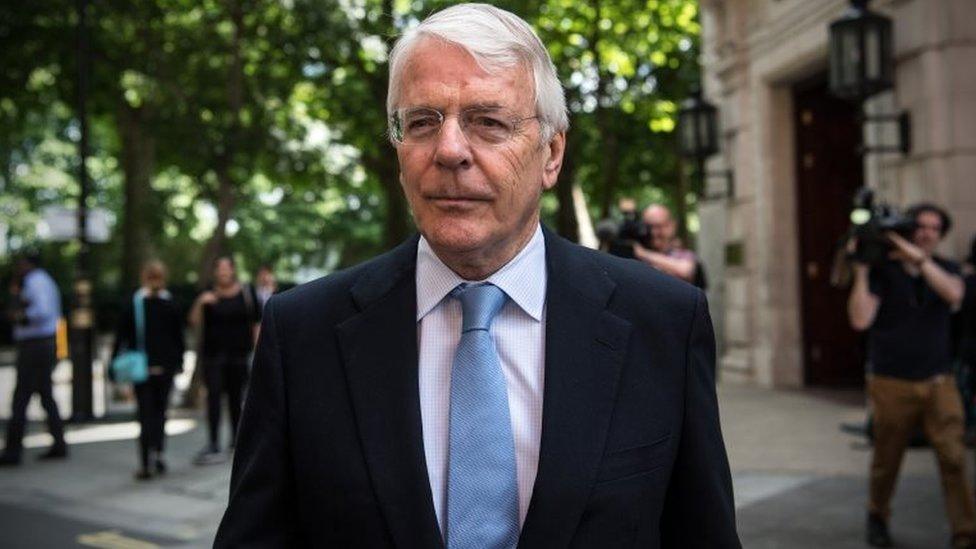Esther McVey won't say if she backs PM's EU trade plan
- Published
- comments
Esther McVey is asked whether she backs Theresa May's Brexit plan
Esther McVey has declined to back Theresa May's Brexit plans, saying she did not want to add to "speculation".
The work and pensions secretary said she was "fully, 100% behind the prime minister" without endorsing her proposal for future trade with the EU.
Cabinet ministers expressed concern about potential compromises with the EU at a meeting at No 10 on Thursday.
The BBC understands concerns centred around plans to ensure no hard border between Ireland and Northern Ireland.
The UK and the EU both want to avoid a "hard border" - physical checks or infrastructure between Northern Ireland and Ireland - but cannot agree how.
The EU has proposed a backstop that would mean Northern Ireland staying in the EU customs union - something the UK says would create a border down the Irish Sea.
BBC political editor Laura Kuenssberg said it was understood that the EU was prepared to accept the idea of the whole of the UK remaining in the customs union if no trade deal can be done by the end of 2020, the so-called "transition period".
But the EU would not accept the UK's bid to put an end date on it - many Brexiteers argue an open-ended arrangement is unacceptable. It is understood that cabinet ministers Liam Fox, Michael Gove, Dominic Raab and Jeremy Hunt expressed concerns.
Helen Grant on the DUP: "I think they are bluffing."
Meanwhile Arlene Foster, leader of the DUP, which supports Mrs May's government on key votes, has said Theresa May cannot in good conscience recommend a Brexit deal that places a trade barrier on businesses moving goods from one part of the UK to another.
The DUP has threatened to withdraw its support for the government if it is not happy with the final Brexit deal.
But Tory MP Helen Grant, a Tory vice chairwoman, told the BBC's Politics Live: "I think they're bluffing."
The UK and the EU have yet to strike a deal on how Brexit will work, with less than six months to go before the UK leaves on 29 March.
Mrs May says she is working for a deal and has urged MPs to "put the national interest first" and support it.
Earlier, asked several times if she backed Mrs May's approach, set out in a White Paper in July, Ms McVey told the BBC: "I am completely supportive of the prime minister as she well knows, what I won't do even for you right now is speculate."
The prime minister says her plan (often called the Chequers plan because that is the name of the country residence where it was agreed) for the UK and EU to share a "common rulebook" for goods, but not services, is the only credible way to avoid a hard border between Northern Ireland and the Republic of Ireland.
But it is opposed by some within her own party who argue it would compromise the UK's sovereignty - former foreign secretary Boris Johnson has led criticism and Brexiteers have backed a "Canada plus plus" deal instead, modelled on Canada's free trade deal with the EU.
Sir Ivan Rogers, the UK's former ambassador to the European Union, dismissed both options in a speech in Cambridge, saying the chances of the EU agreeing to either was "precisely zero" and that there had been "culpable naivety" in the negotiations.

Meanwhile the EU says its negotiators are working "day and night" to try to reach an agreement ahead of Wednesday's summit.
The UK is expected to come up with new proposals as an alternative to the "backstop" put forward by the EU - which the government has rejected, saying it would threaten the integrity of the UK.
Mrs May relies on DUP support in key votes because the Conservatives do not have a majority in the House of Commons.
On Wednesday it was revealed that the DUP was prepared to vote against the Budget on 29 October - which could threaten the future of the government - if there are any new barriers between Northern Ireland and the rest of the UK as a result of Brexit.
'Politically sensitive'
And in a vote on the Agriculture Bill, it did not back the Conservatives in what DUP sources said was a "warning shot" for the government.
On Wednesday, EU chief negotiator Michel Barnier said there would have to be checks on goods travelling to Northern Ireland from the rest of the UK, because they would effectively be arriving in the EU's single market if there was no hard border with the Republic of Ireland.
"I understand why such procedures are politically sensitive," he said, but added "Brexit was not our choice, it is the choice of the UK."
The EU and UK have agreed that these checks "cannot be performed at the border" and the EU proposes to carry them out "in the least intrusive way possible", he said.
Former Prime Minister Sir John Major, meanwhile, has said he has "great sympathy" for Mrs May, telling the BBC's Political Thinking podcast that "the way she's being treated by some of her colleagues is absolutely outrageous".
He hit out the "not so subliminal bullying" by Tories opposing her strategy in the middle of negotiations and also criticised International Development Secretary Penny Mordaunt, who declined to give the PM's plan her explicit backing when asked earlier this week.
"If people are sitting in cabinet they either support the government's policy or they don't sit in cabinet," Sir John said.
